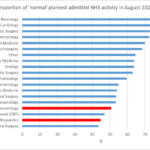 by Sue Brown, CEO ARMA
by Sue Brown, CEO ARMA
At the end of Bone and Joint Week (12 – 20 October) I reflect on how much things have changed in just ten days. It is an increasingly worrying time for both healthcare professionals and people with MSK conditions. The response to Covid-19 has already had a significant impact on the MSK health of the nation. The need for good MSK services has grown. During lockdown people worked from makeshift home offices, were less active and many were afraid to use NHS services even when they needed them.…
Read more of this article



 by Sue Brown, CEO ARMA
by Sue Brown, CEO ARMA